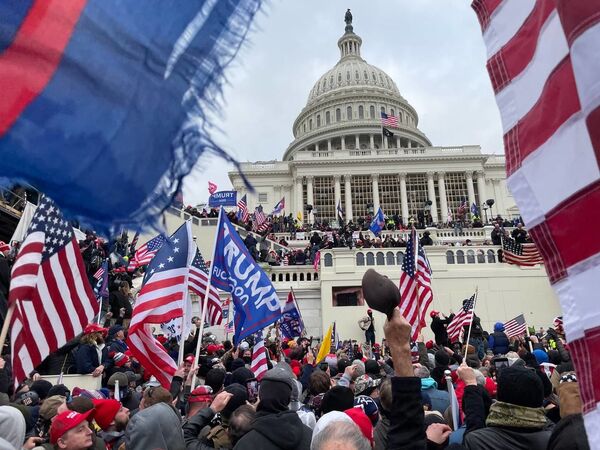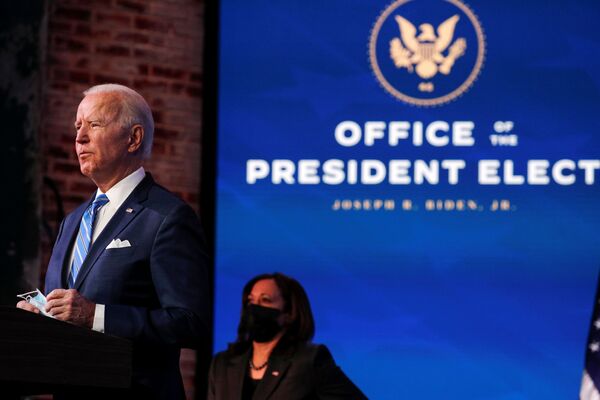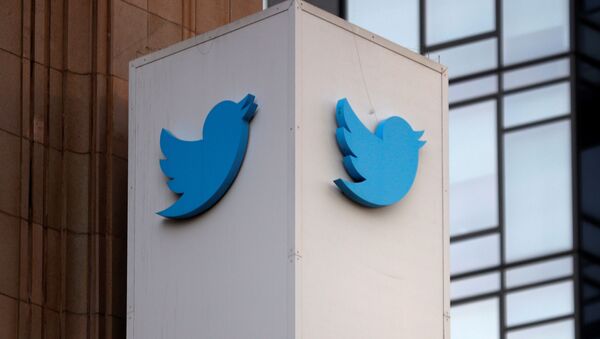Twitter blocked Donald Trump's account for good on 8 January, citing "the risk of further incitement of violence", as the president was widely accused of being responsible for inciting his supporters to breach the US Capitol in the riotous events of 6 January.
Twitter CEO Jack Dorsey at the time conceded that there are "real and significant ramifications" to the blocking of an account with more than 88 million followers, adding the move constitutes a "dangerous" precedent.
The decision immediately triggered a wave of warnings of big tech’s political bias and ramped up censorship.
Here is a glimpse into the dynamics at play behind the controversial decision to shutter the account of the US President.
‘Misgivings’ Over Suspension
Twitter’s chief executive had received a phone call from Vijaya Gadde, Twitter’s top lawyer and safety expert, on 6 January to update him that along with company executives she had decided to temporarily suspend President Trump’s account to prevent him from posting statements that might purportedly provoke more violence. This followed an attack by a mob of Trump supporters on the US Capitol that day, writes The New York Times.

The move left Dorsey, who had earlier delegated moderation decisions to Gadde, concerned, claim sources cited by the publication.
Throughout Trump’s White House tenure the Twitter CEO had pushed back against demands by liberals and other POTUS critics that the microblogging service terminate his account, ostensibly arguing that the platform was a place where world leaders could ‘speak freely’, but also because he considered the president’s posts newsworthy.
Dorsey was said to have emailed employees, saying it was important for the company to remain ‘consistent’ with its policies. These policies allowed for a user to return after a suspension.
The following day, Dorsey shared several tweets urging caution against a permanent ban of Trump. After the suspension was lifted the next day, Twitter monitored the response to Donald Trump’s tweets across the internet.
Dorsey was subsequently briefed that Trump’s followers had ostensibly seized on the POTUS’s latest tweeted messages to call for more violence.
The referenced tweets on 8 January by President Trump had vowed “American Patriots” who voted for him would have a “giant voice long into the future”. Another Twitter post added that Trump did not intend to attend the inauguration of President-elect Joe Biden.

Twitter’s safety team claimed the posts should be viewed "in the context of broader events in the country and the ways in which the President’s statements can be mobilised by different audiences".
In posts on alternative social networking site Parler, the potential for more ‘real-world unrest’ was perceived as too high.
Twitter employees, including lawmakers, tech investors and others, were also cited as having urged the bosses that Trump be booted off the service, with over 300 staff signing a letter to that effect. The decision to bar Trump, however, preceded the delivery of the letter, claim sources.
A hint at the tensions within Twitter was offered by Jack Dorsey himself in a spate of tweets on 14 January where he wrote that he did “not celebrate or feel pride in our having to ban @realDonaldTrump”. Dorsey admitted the move was a testament to the company’s failure to ‘promote healthy conversation.’
I do not celebrate or feel pride in our having to ban @realDonaldTrump from Twitter, or how we got here. After a clear warning we’d take this action, we made a decision with the best information we had based on threats to physical safety both on and off Twitter. Was this correct?
— jack (@jack) January 14, 2021
Big Tech Under Fire
Since the clampdown, Twitter has been embroiled in a heated debate over big tech influence, censorship and the companies’ accountability.
Lawmaker Devin Nunes, a Republican from California, railed against the decision by Twitter as he appeared in a segment of "Watters' World” on Fox News.
“From what I saw in that leaked video, it sounds like he’s(@jack) ready and willing to take more harsh action against people expressing themselves on social media” - @JesseBWatters #ExposeTwitter pic.twitter.com/KpWnv4Pp6Y
— Project Veritas (@Project_Veritas) January 17, 2021
Together with host, Jesse Watters, the US Representative for California's 22nd congressional district discussed the explosive leaked video of CEO Jack Dorsey addressing staff at a virtual meeting.
BREAKING: @Twitter Insider Secretly Records CEO @jack Detailing Agenda For Further Political Censorship
— James O'Keefe (@JamesOKeefeIII) January 14, 2021
“We are focused on one account [@realDonaldTrump] right now but this is going to be MUCH BIGGER than just one account & it’s going to go on for much longer..."#ExposeTwitter pic.twitter.com/QhyyUTHlM9
The tape, allegedly provided to the outlet by a Twitter "insider whistleblower", reveals what appears to be plans to push ahead with the platform’s censorship policy further than banning President Donald Trump’s account.
Dorsey is heard instructing staff to focus on the big picture ahead, beyond “the inauguration”.
"So, the focus is certainly on this account and how it ties to real-world violence. But also, we need to think much longer-term around how these dynamics play out over time. I don't believe this is going away anytime soon," says Jack Dorsey in the video.
The Twitter CEO then adds that the current company moves were part of a "much broader approach that we should be looking at and going deeper on."
In response to the explosive report, a Twitter spokesperson was quoted by Fox News as saying the remarks in the video were “nearly the same words” that Dorsey had shared in a Twitter thread offering “context around and reflections on our work to protect the conversation in recent weeks".
The official response was dismissed as ‘mealy-mothed’ by the host of Watter’s World, with Devin Nunes slamming the moves by Twitter as sick and demented’.
Twitter Not Done Banning Conservatives: See the leaked video of CEO Jack Dorsey as @DevinNunes reacts, tonight. #FoxNews 8PM ET. pic.twitter.com/itjgU9NxSV
— Watters' World (@WattersWorld) January 16, 2021
Twitter has since been accused of following double standards by removing Trump but not ‘autocrats’ elsewhere on the platform.
“This is a phenomenal exercise of power to de-platform the president of the United States… It should set off a broader reckoning,” Evelyn Douek, a lecturer at Harvard Law School, was cited by The New York Times as saying.


